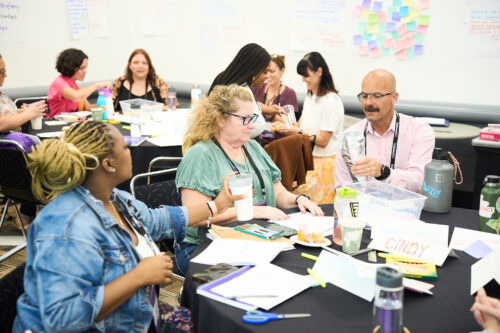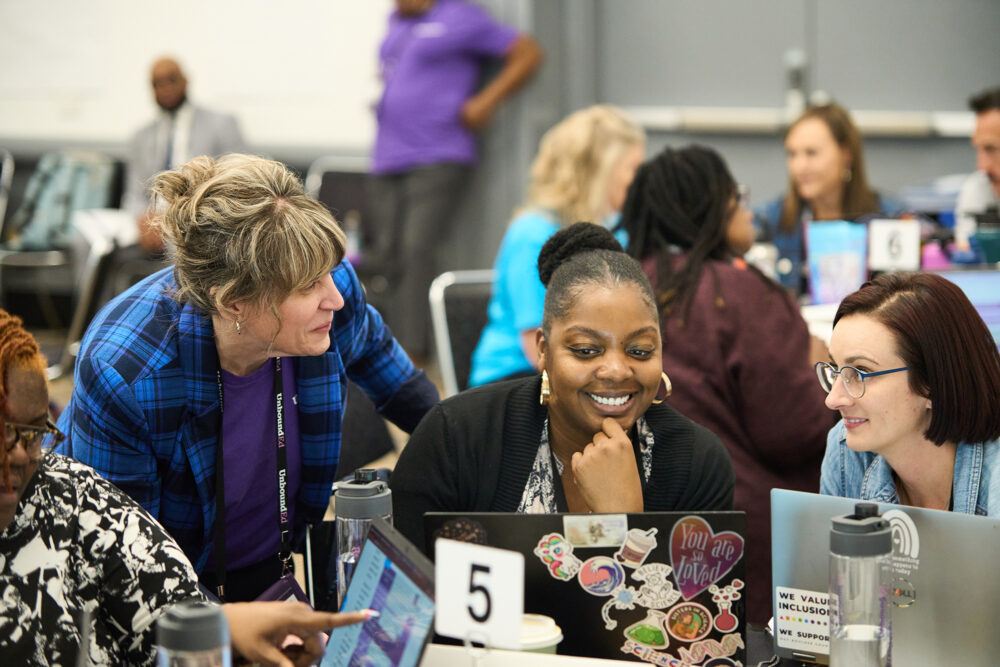
By Valery Dragon, Vice President, Leadership Programs
This is the third blog in a three-part series in which we consider how actions, beliefs, and knowledge impact leadership and identity.
As a former school leader, I have observed the impact of confusing capacity with competency, a misunderstanding that affects outcomes significantly. While they may seem similar, when mining for one’s capacity, you explore the conditions that may impact performance or question someone’s willingness. Competency is more straightforward and skill-driven – you either have it or you don’t.
So why is it important to reflect on the difference? I’ll tell you about my first month as a new leader. I left a position teaching high school English Language Arts (ELA) to serve as a coach and teacher for multilingual learners, and I ultimately joined a program for aspiring principals. Three months into the program, I became an assistant principal at a charter network, and the CEO of the network asked me what I would prioritize to shift the instructional culture of the building. I shared three priorities, and he gave me feedback on what I had identified. To my surprise, he then asked if I would consider becoming the principal of the school I was at.
Unsure of myself, I started to talk him out of the offer, insisting that he take that ask to another longstanding assistant principal. He responded, “You have a lot of capacity, and that’s what we need.” I accepted the offer and came into the building leaning into my capacity. I had the capacity to set up structures and processes, norm language, create meeting protocols, and establish credibility. To support my staff, I was able to organize teams, supply them with the right tools, and allocate the appropriate time needed to operationalize our mission through the lens of those same teams and tools. But what about my competence?
After about a month, my ELA classrooms were thriving. Since I was a former ELA teacher, I could go deep into the work with them, co-teach with them, hold model lessons, co-plan, reflect on student misconceptions, and create grade-aligned scaffolds. With the high volume of text-derived primary resources, my history teachers were experiencing the same professional successes and growth in student achievement. My math team, however, was not experiencing that level of success. I didn’t know how to coach or correct what was and wasn’t happening, and an honest reflection on my competencies in math compelled me to seek support from a network coach to build my skills. After some side-by-side coaching and normed use of shared resources across established coaching cycles, the math classrooms experienced a shift in teacher practice and student performance with more relevant and precise feedback.
For all of my capacity, I didn’t innately hold the necessary competencies to shift math outcomes. I was relieved I didn’t conflate my willingness to learn or my capacity to learn as a competency. Of course, that sent me on a journey to explore various competencies—those written on a job description and the ones that only came from interacting with careholders. These competencies were required against the history of this school, this city, and this country. I began a journey to align all of my capacities to competencies.
I pondered about the following areas of knowledge and encourage you to do the same:
- Instructional knowledge: What do you know and understand about the major work of each grade across the content areas/ your course offerings?
- Cultural knowledge: What do you know about the identity and experiences of careholders within this community and beyond?
- Operational knowledge: What do you know about the procedures that reveal or fuel systemic beliefs and actions(practices)?
With these considerations, take the following assessment to help facilitate an authentic reflection of your instructional, cultural, and operational knowledge.
Read the Blog Series


Leadership & Identity: Beliefs

Leadership & Identity: Knowledge
Next steps with GLEAM®
Choose the path that fits your team

Standards Institute™
At Standards Institute, educators cultivate the mindsets, skill sets, and tools to provide grade-level, engaging, affirming, and meaningful instruction.
Learn More ➜
UnboundEd Summits
Accelerate your instructional vision and build educators’ skills and expertise with a virtual or on-site Local Summit.
Learn More ➜

In-Service Workshops
UnboundEd’s dynamic, hands-on workshops build educator capacity by focusing on timeless, cross-disciplinary instructional moves that drive effective instruction, rigor, and student empowerment.
Learn More ➜
Online Math Academy
UnboundEd’s Online Math Academy courses enrich educators’ content knowledge and instructional practices to unlock all students’ math potential.
Learn More ➜
Curriculum Adoption
Ensuring quality materials are adopted and used effectively is crucial to improving outcomes and requires a strong instructional materials selection process. We’re here to share guidance and support on leading a rigorous and collaborative curriculum adoption process to select the right materials for your context and goals.
Learn More ➜
Curriculum Implementation
Just getting started, or need to get back on track? We work with you on a shared vision and an actionable plan for curriculum success.
Learn More ➜
Literacy ReclaimEd
Improve literacy instruction and better meet the unique needs of every student.
Learn More ➜
GLEAM® Inventory
Build your team’s understanding of grade-level, engaging, affirming, and meaningful –GLEAM®– instruction and transform how you serve all students in your district.
Learn More ➜
Speaking Engagements
Our experts offer inspiring, thought-provoking messages and conversations that will get your team thinking creatively about shifting mindsets and changing practice.
Learn More ➜
California Math Curriculum Adoption and Launch Cohort
Prepare to adopt and launch high-quality mathematics instructional materials with no-cost, grant-funded support from UnboundEd.
Learn More ➜